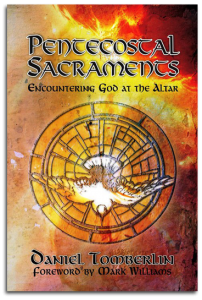Daniel Tomberlin: Encountering God at the Altar
 Daniel Tomberlin, Encountering God at the Altar: The Sacraments in Pentecostal Worship (Cleveland, TN: Center for Pentecostal Leadership and Care, 2006).
Daniel Tomberlin, Encountering God at the Altar: The Sacraments in Pentecostal Worship (Cleveland, TN: Center for Pentecostal Leadership and Care, 2006).
Since the beginning of the Pentecostal movement, experiencing the Spirit of God has been central to Pentecostals in both private and corporate worship. When it comes to congregational worship, Pentecostals have critiqued what they deem to be dead ritualism devoid of a personal experience of the Holy Spirit. As a result, Pentecostals have questioned many traditional practices relating to the sacraments (often viewed as theologically or historically suspect because of their relation to the Roman Catholic Church) and have opted for the term “ordinances” instead. The latter is often seen to be more of a faith-based means rather then a works-based means of experiencing the Spirit.
Daniel Tomberlin, pastor of Bainbridge Church of God (Bainbridge, GA) and chairman of Ministerial Development for the Church of God (Cleveland, TN) in South Georgia, has authored a book that will raise some eyebrows. In it, Tomberlin claims that Pentecostalism and sacramental worship are not mutually exclusive. Rather, he provides a stimulating discussion of how he believes Pentecostal worship is sacramental. This volume, which aims to provide an introduction to the subject for Pentecostal church leaders, is possibly one of the first educational resources of its kind published by a classical Pentecostal denomination.

Cover from the updated 2010 publication of Pentecostal Sacraments: Encountering God at the Altar.
Encountering God at the Altar touches on topics such as Pentecostal worship and spirituality. Tomberlin develops a Pentecostal theology of the sacraments and also explores the practice of the sacraments in Pentecostal worship. In following Church of God theologian Kenneth Archer, Tomberlin argues for the retrieval of the term sacrament over the term ordinance, claiming that the ordinances are sacramental—a “means of grace” where one encounters the Holy Spirit (p. 24). The author rightly points out that Pentecostal spirituality is centered on encountering the Holy Spirit. “Therefore,” Tomberlin states, “the center and focus of Pentecostal worship is the altar” (p. 19).
When addressing whether life in the church and the sacraments are essential to salvation, Tomberlin identifies the church and sacraments as “secondary salvific gifts,” compared to the Son and Spirit as “primary salvific gifts” from the Father. At the same time he ultimately admits “that participation in the sacramental life of the church may not be absolutely essential to salvation due to God’s prevenient grace” (p. 27). While being open to other sacramental means of encountering the Spirit of God, Tomberlin only addresses the significance of the three institutional ordinances his own denomination recognizes: water baptism, the Lord’s Supper, and foot washing. With a Pentecostal theology of the sacraments in place, Tomberlin then provides practical instruction and advice on how pastors can to implement the sacraments in the context of Pentecostal worship.
Category: Ministry, Winter 2008


